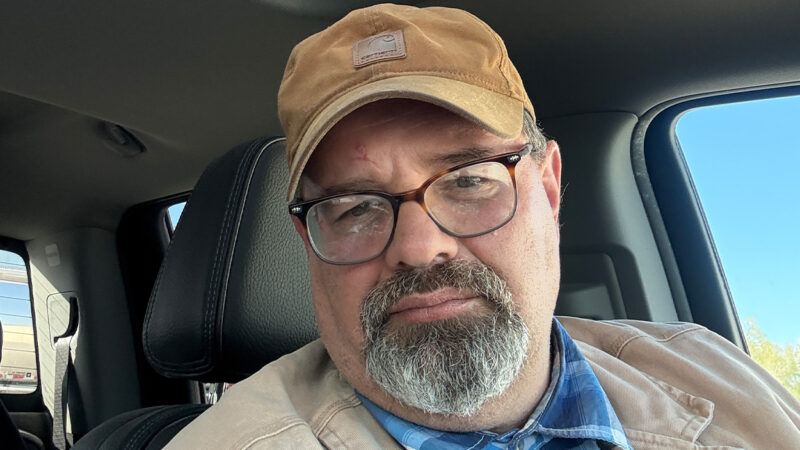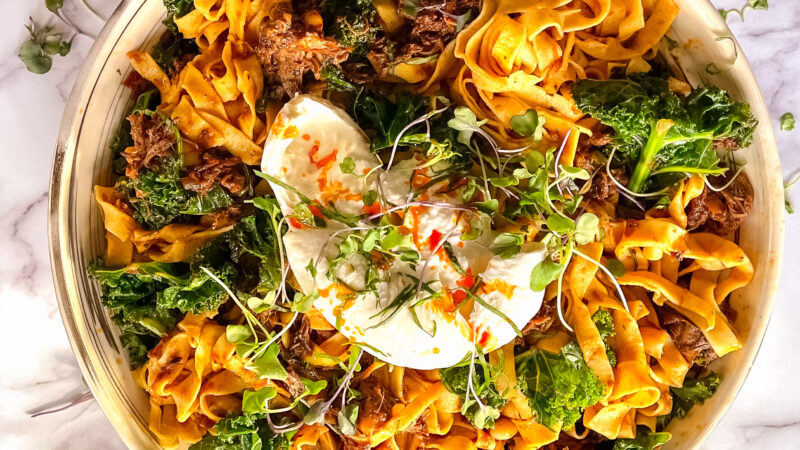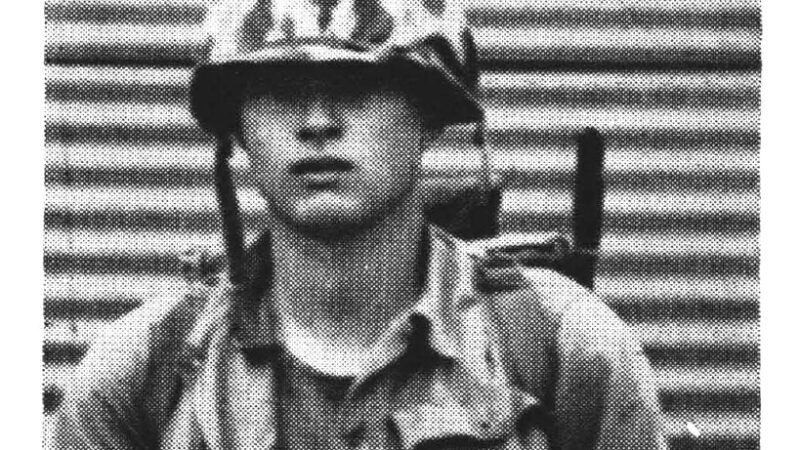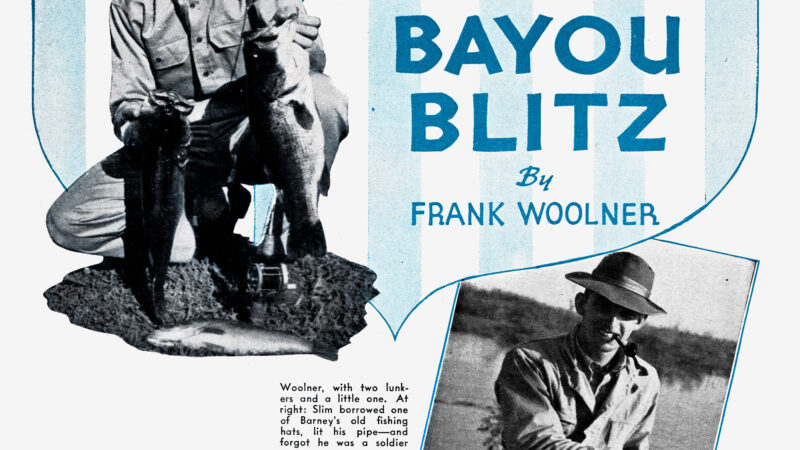How a Feud Between Two Pointers Turned Them into True Quail Dogs
This story, “The Devil’s Breed,” appeared in the January 1950 issue of Outdoor Life.
“Nope,” I said emphatically, “this is one feud I intend to stay out of.”
Dan McGinty’s eyes were as hard and bright as fresh-chipped flint.
“What’re you trying to do,” he demanded, “leave me in this alone? You—”
“Whoa!” I said. “Steady, podner. I’m just thinking what will happen if we get the Admiral chewed up again, or snake-bit, or if he runs out of the country. Old Mike would cut you up in chunks and feed you to his dogs. Then he’d come gunning for me.”
“You’re afraid,” Dan taunted. “You haven’t got the guts to see it through.”
“O.K., O.K.,” I said. “I’ll go along! But the only way this can possibly end is by somebody getting hurt.”
I took my 20 gauge off the rack and crammed a handful of shells into the pocket of my hunting coat. Beyond the porch steps the Georgia woods and fields were washed in ochre sunshine that gave scant warmth to the December earth. A cold wind trooped across the swamp and up the meadow, spilling through the pliant sedge and turning up the bright hems of the pines. The day was perfect for quail. Under different circumstances I would have been fizzing over with eagerness. But not today. Only once had I seen Mike’s rage approach the homicidal stage. But once was enough.
Dan flipped open the trunk of his car. Lucky Admiral jumped down, made an exploratory circle of the yard, left his calling card at the garden gate, and came back, leaping against the boy. Dan snapped his chain into the collar ring and passed the leash to me.
“Hold on,” he said. “This is the first big test.”
Now for the Showdown
I held on while he went after Smoke, my black-and-white pointer. In a moment he reappeared with him on leash, leaning against the dog’s rawboned weight. Smoke stopped when he saw the Admiral and cocked his head inquisitively at me. The dog on the end of my leash suddenly lunged forward, almost jerking the chain out of my fist. I set him back on his haunches, hard, but he lurched to his feet again — his hackles up like a wire brush — and rumbled in his throat. I squatted on my heels and dragged his head around. His eyes were bright and brown and intense. Risking a handful of fingers, I caught his muzzle and pulled him close.
“The war’s over,” I said. “Take it easy.”
I spoke quietly and he quit struggling. I scratched his ear and stood up, comparing the two dogs. Lucky Admiral was white, with splotches of lemon around his head and tail, and lightly ticked on the legs. He was a big dog, with massive chest and corded hindquarters. But even beside him, Smoke looked ready to saddle and ride. Standing a good six inches taller and built in proportion, he was an animal of great endurance and courage, one you looked at twice before you turned your eyes away.
It was hard to believe that these two pointers were litter mates. One was day, the other night. Smoke’s white was set off by ebony, from the spreading patch on his starboard side to his coalblack ears. But both had been sired by Spunky Admiral’s lusty loins, out of Brown Betty, the top bitch of Magnolia kennels. They had been whelped into a conflict which was now in a fair way of costing old Mike McGinty the National and, possibly, his very life.
Mike was one of those fellows whose friendship can’t be reckoned in terms of months or years. The first time I shook his beefy hand and looked into his eyes, I felt as though I were greeting an old friend. He had a way with men and dogs — his pointers would run their hearts out for one word of his rough praise. This clash between Lucky and Smoke was one of the few insurrections he had not been able to ride roughshod into submission.
It started before the puppies were a day old. I had found old Mike leaning on the rail of a delivery stall, stolidly looking down on Brown Betty’s new litter, and moaning like an emasculated bull. Five of the newborn were white, with traces of lemon. One looked almost black in the dim light.
“Where in hell,” he said, “do you reckon she got that one?”
“If you remember old Spunky Admiral,” I suggested slyly, “he had a lot of devilment in him.”
“Hum-mph,” Mike grumbled. “It looks just like the Walker hound that climbed the kennel fence the night before she was bred. He must have come closer than I thought. That pup looks like the devil’s own breed.”
From the very beginning the puppies shared Mike’s emotion toward their odd brother. He wriggled around to find a teat and two of them pushed him away. Mike picked the black member off the straw and held it up for quizzical examination.
“He’ll Do to Drown”
“Off color,” he said. “Legs and neck too long. Head too heavy. Won’t ever shape up right. Reckon he’ll do to drown.”
Dan, Mike’s eighteen-year-old, reached over and lifted the puppy out of his father’s hand.
“You promised me a dog,” he said. “Can I have this one?”
A twinkle played around the corner of the old man’s eyes.
“The experience,” he said gruffly, “will be worth more to you than to him.”
That was my introduction to Smoke. For more than a year I followed the puppy’s career through young McGinty’s eyes. Dan raised him on a bottle, and, against his dad’s advice, began his training period almost before the dog was weaned. At six months he was retrieving anything he could pick up or drag. True to Mike’s prediction, he had not filled out like the other members of his litter, but was all legs and head, and large, soulful eyes. And he was definitely ostracized from the society of the kennel. Each time he casually walked past, the other dogs crowded against the fence, clamoring with all the vituperative names in canine language. Once, when his father was away, Dan tried to remedy Smoke’s status by setting him down on the puppy runway. Instantly the young dogs piled on him in a pack. He was going down for the count when Dan got him and swept him off the ground.
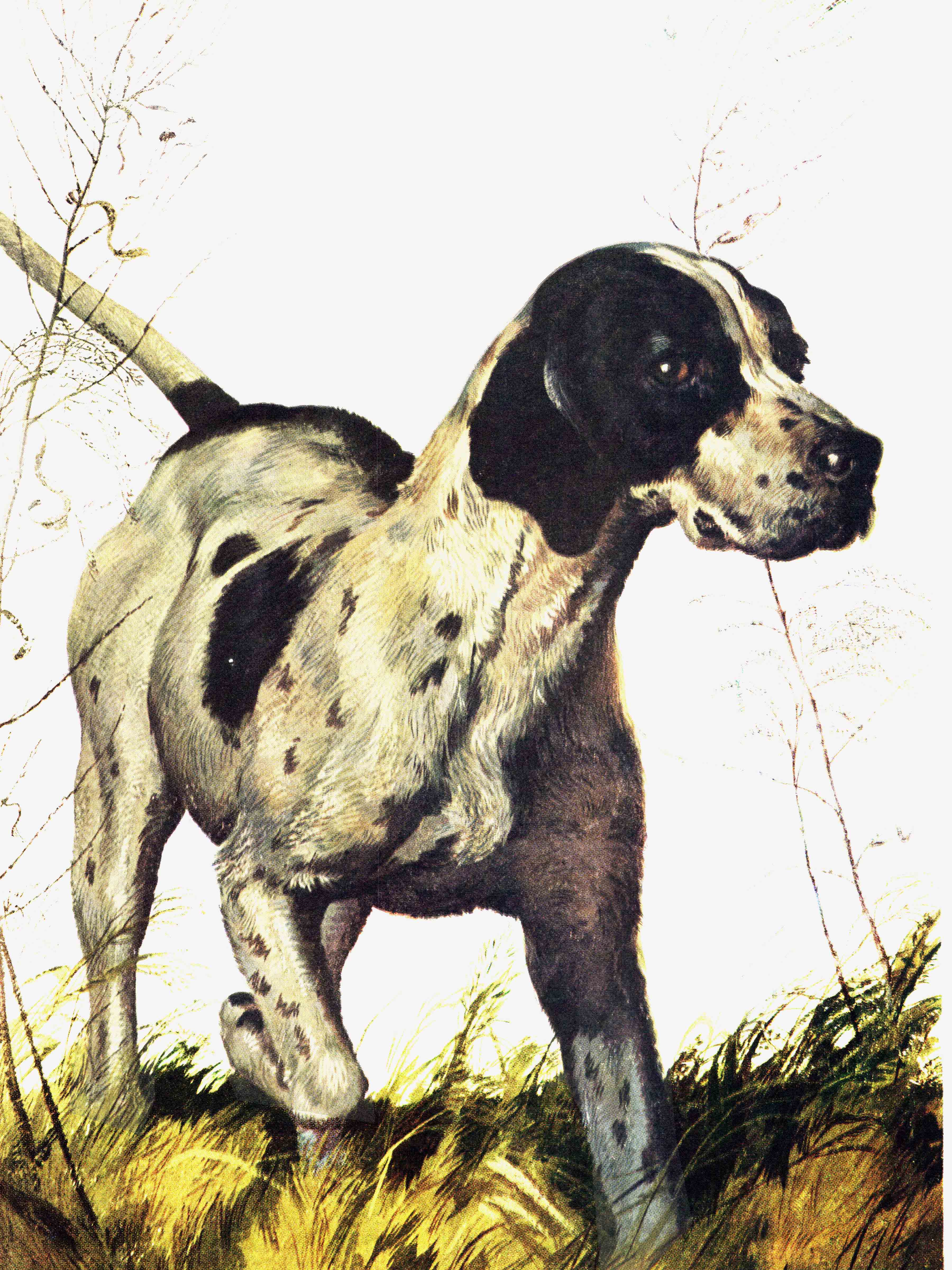
Only once during his first year did Smoke make a strong bid for the guillotine. Dan had marched him down to introduce him to the quail covey in the lespedeza field beyond the stock barn. As they approached the patch, a pair of guinea fowl ran across the road. Smoke went after them and they flew into the big oaks beyond the feed lot. From that moment on, guineas were his first love. He spent most of the time, when he was not chained under the back steps, running them out of the yard and ferreting them from the dense cassena thicket on the slope between the barnyard and the river.
“If you ever get hungry,” Mike chuckled, “you’ve got a great meat dog.”
In the meantime, Mike had selected the most likely puppy out of Brown Betty’s litter and registered it under the name of Lucky Admiral. Lucky went into his training period seriously and with enthusiasm. Under Mike’s relentless tutoring he grew in strength and endurance. Since he had a talent for dramatics, his style came natural and easy, and Mike polished his bird sense constantly.
The hatred that his kennel mates bore for Smoke seemed to be concentrated in Lucky. Smoke annoyed him constantly by parading up and down the fence while Lucky tried to tear the wire out with his teeth. The growing bitterness came to a head one day when Mike turned the Admiral out and whistled him to the hunting wagon. Lucky made his customary swing over the yard and around the tool shed beyond the road. At a corner of the shed he collided head-on with Smoke. He roared and lunged, and the black-and-white, caught off balance, went down. But he was up in an instant, meeting the second assault silently, trading blow for blow in short, savage thrusts.
Mike, hearing the tumult, came on a dead run. With a bellow of rage, he kicked Smoke sprawling against the shed wall, and picked Lucky off the ground by his collar. Then he saw the gash which ran from Lucky’s shoulder to his ear. Blood was spilling out, soaking into the white fur, running down Mike’s hand. The trainer drove his No. 10 boot at Smoke’s ribs, but the pointer leaped aside and stood with his head angled and his tongue out.
“You— you—” Mike spluttered, his face purpling.
Dan, who’d been riding up the river road, heard his father’s voice and gave his horse the heel. He galloped into the yard where the old trainer was leaning over Lucky, his face almost black with rage.
“Get my gun,” Mike boomed. “No! Get the jeep. I’ll tend to that scum when I get back.”
Dr. Tobe, the veterinarian, and Mike were old friends. The vet sewed Lucky’s hide together and said he’d be all right in a week or two. But Tobe was more concerned over Mike. After he had gloved Lucky to keep him from clawing open the wound, he pushed the trainer down in a chair and stood over him.
“You old reprobate,” he said. “Your heart will burst wide open some day and it’ll serve you right. It knocked you out once when you had one of those senseless fits. You ought to be old enough to know that dogs fight occasionally, just like people.”
“One dog on my place will never fight again,” Mike growled. “I’ll wring his neck with my bare hands.”
“Get rid of him,” Tobe agreed, “if it’ll help ease your blood pressure.”
Well, that was the story I heard when Dan came to my house with Smoke. In Dan was a curious mixture of fire from the old man, and gentleness and patience from his mother. When he walked up my back steps, he was burning like magnesium.
“Smoke’s yours,” he said, “if you want him. I’m leaving home.”
We deposited Smoke in a pen and I pulled Dan into the house. From the depth of my easy chair he got it all off his chest. I did lot of talking then, finally getting him to agree that — temporarily at least — he’d keep his feet under his father’s table and help me develop Smoke into a first-class shooting dog.
Away from the influence of the guineas, Smoke suddenly became conscious that the world around him was filled with warm and wonderful essence of bobwhite. Dan’s toughest job was breaking him to commands under the leash. But the boy had arms like a young gorilla, along with an idea that Smoke’s neck was made out of bull hide.
Once he was yard-broke, the rest was easy. He was a natural hunter.
Not an Apt Scholar
The first real hunt we gave the young dog was with Rip, an ancient pointer who had more bird sense than speed and stamina. Rip was the kind of dog you strolled with on a hunt. He worked close in, usually within gunshot range, so we thought he might tend to influence the scope of Smoke’s operations. But if the big dog learned any lessons from Rip, they did not include range. We put them down in the edge of my pecan grove. Dan touched his whistle and they took off across an open slope. Rip galloped in Smoke’s tracks for about a hundred yards, then skidded to a halt and watched Smoke run out of sight a quarter of a mile away over the brow of a hill. Then he turned his head and looked back at me, laughing with his tongue out. I waved him on.
“I’d better go back for the horses,” Dan said.
“No,” I said, “let him run. Maybe he’ll settle down when his fuel burns out.”
Rip worked the sidehill leisurely and found his first covey at the edge of a narrow swamp. We walked around him in the knee-high marsh grass and were standing in the middle of the birds when the bomb went off. A white-throated bob almost knocked my hat off. I ducked and swung, but every brown bird was directly in line with Dan. He dumped one that spilled on the sloping hill and the covey wheeled into the swamp.
Rip retrieved and Smoke came back, flashing over the hill with long, low strides. Dan let him mouth the quail before he dropped it in his jacket.
“You stay close now,” he said, “and watch how it’s done.”
It didn’t take us long to learn that unless we kept him on a leash, holding Smoke in close was like trying to limit the range of an arctic tern. After that first day we worked him with the jeep or horses.
My kennel-ration formula was the same as Mike’s, but under the daily grind of hard training that Dan was giving Smoke, I added protein and doubled the portion we dished up to the big dog. As I hoped, he responded by filling out between his widely spaced forelegs, and in his bulging hindquarters. The black ticks grew prominent on his legs and muzzle, and the midnight portions of his coat shone with shoe-polish luster.
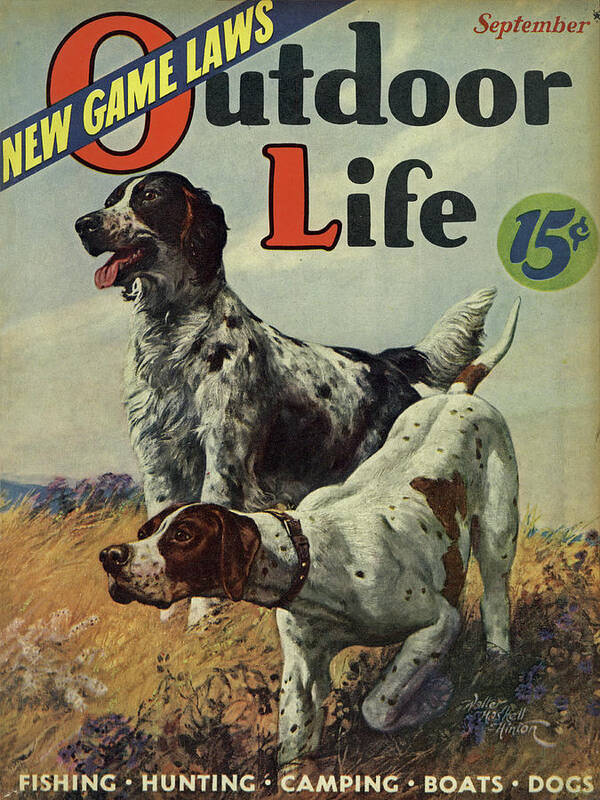
Lucky Admiral came home, healed and ready for the final touches of his training before he headed out for Saskatchewan on the long road that led to Grand Junction and the national championship. But it wasn’t the same Lucky that Mike had carried into Dr. Tobe’s in his arms. He hadn’t lost any of his speed or range, and his nose was as infallible as a Geiger counter, but the spark was gone. It showed in his style, his heavy tail. Mike pleaded, threatened, whipped, got redder and redder. He had been close but never on top of a national championship. And the way he had it figured, his one big chance was now slipping away with Lucky.
The day had been cold and windy, and Smoke and Dan came in from a short cast along the river. Dan peeled off his boots and sat with his toes to the fire.
“I’ve been thinking about that Lucky dog all afternoon,” he said.
“I’m worried more about your father than Lucky,” I replied. He nodded. “If he doesn’t send a dog to the prairies this year, we’ll have him to bury.”
He cut his eyes sidewise at me. “I know what’s wrong with Lucky.”
I looked at him over the bowl of my pipe. “You do? Why don’t you tell the old man?”
Dan snorted. “Think he’d listen? Not to me. And not when it involves Smoke.”
“Smoke?” I said.
“There are two spark plugs that can drive any intelligent animal to greatness.” Dan was speaking beyond the wisdom of his years, and I must have listened with my face hanging out. “One is love, the other hate. Lucky’s bid for greatness was built on hate. His hatred for Smoke was almost a passion. When he came back from Dr. Tobe’s, Smoke was gone. He’s bewildered without knowing why. But if I take Smoke back, pop will kill him. So I’m going to bring Lucky over here.”
“No,” I said flatly.
“You and I,” Dan said, not hearing me, “will run the greatest race anyone ever saw.”
“No,” I repeated.
“My father,” the boy said, pulling on his boots, “is a little too old to reason with, and he’s not going to like the idea — at first.”
I followed him outside and he stopped for a moment on the steps, his face grave.
“If it doesn’t work,” he said, “heaven help us both.”
The Real Test — in Action
That’s how I was caught in the complicated web spun by two dogs and a father and his son. When Dan came rolling in with Lucky the next morning, Will, one of my plantation hands, had saddle horses ready. He led them into the big sedge field across the road, and awaited our orders.
“Maybe,” said Dan, “it’ll be better if we start the dogs wide.”
I nodded and he pulled Smoke a hundred yards away and set him up, his head and tail high. Twice he glanced over his shoulder and down the road. Then it seeped into my thick skull that he was waiting for someone. Suddenly the whole scheme hit me like a load of No. 8’s. He had planted the set-up for Mike! I knew it even before I heard the roar of the jeep, the shrill sound of Dan’s whistle. Recklessly I let Lucky go, aware of brakes squalling behind me.
From instinct and training both dogs cast straight away, running as though they sensed the tension in the air. Then a cloud of dust enveloped me, and Mike was bellowing unintelligible sounds into my ear. But I didn’t take my eyes off the dogs. They met at the apex of the triangle, a hundred yards out, running together with a sound like meat slapped on a cutting block. Down they went in the short sedge, rolling, slashing, fighting furiously. Mike suddenly stopped yelling and as suddenly snatched the 20 gauge out of my hands, throwing its bead on the tangled dogs. I jumped forward to knock the barrel up, but the gun exploded in his hands. The pointers yowled and sprang apart, and then Dan was running toward them.
Teamwork That Paid Off
Mike’s frenzy had changed to slow motion, and his breath came hard. He pushed the gun toward me, clutched at his stomach, and would have fallen if I hadn’t put out a hand. I passed the gun to Will and put my arm around Mike, but he shook it off.
“Dammit,” he gasped, “I’m all right.”
“Get in the jeep,” I commanded.
“The dogs,” he said.
I followed his eyes back across the field. Dan was plying his leash with a hard hand and had both dogs at his feet. Even from a distance I knew all the fight was gone out of them. Then he pulled up Lucky, setting his tail high and whacking him across the rump to keep it there. He dragged Smoke up beside the other dog and held him, daring either one to move. After a long minute he touched his whistle and they raced away, in perfect rhythm, swinging wide to the edge of the field.
Mike took an unsteady step to the jeep and I helped him lift his bulk into the passenger seat.
“We’re going to the doctor,” I said.
He shook his head. “I’m all right. Follow the dogs.”
“Dammit, man—”
He was turning purple again, so I said, “O.K., O.K. Calm down.”
Now Dan was back, reaching for a horse. He threw a grin at his father — too excited to observe Mike’s flushed face and overbright eyes — and swung into the saddle. I got the jeep started and we bounced after him down the field, where the dogs were winging in from the first long cast. Dan waved his hand and they were gone again, taking the rim of the big pine grove that marched up from the creek.
Lucky was thirty yards behind when Smoke found the first covey. He skidded to a stop, swung dramatically and stood as though he were posing for a picture. At Dan’s sharp word, Lucky hesitated and then backed. Old Mike had trained his pupil well.
Dan raised his hand.
“Point!”
Mike’s knuckles were white around the windshield rod.
“I don’t believe it,” he said, “not a damn word of it. Get out there and shoot.”
It seemed that I was in the hands of the McGintys, so I slid shells into my double and walked to where Dan had dismounted. We shuffled into the pines and the covey broke, ten yards beyond Smoke’s nose. They blasted through the trees and I took one on the left. Dan dumped two bobs flying straightaway. I marked my bird down and glanced at the dogs. Both were stanch to wing and shot, though Lucky was trembling as though he had a chill.
“Dead!” Dan yelled.
They were away instantly. Lucky had seen my quail go down, and he swung in to the left. Smoke picked up the bird nearest to Dan. Both retrieves were perfect, though Smoke’s mouth was a bit too rough.
“Now,” said Dan, “this is the pay-off — if it works.”
“Down,” he said to Smoke. The black-and-white crouched, his dark eyes on the youngster.
“Dead, Lucky!”
Smoke made a move to rise, and Dan pushed him against the ground, hard. The pointer lay still. Lucky circled twice and picked up the third quail, then trotted in with his head up, scarcely glancing at Smoke. Dan took the bird, patted Lucky’s head, and shrilled the whistle.
Read Next: The Best Dog Training Collars, Tested and Reviewed
“Get out,” he yelled, “and hunt!”
Both dogs took off at a dizzy pace.
Mike was sitting very straight in the jeep, but his face was no longer florid. And there was a look in his eyes I had never seen there before, like the eyes of a child gazing at his first Christmas tree.
“When a man has to be shot on the ground,” he said slowly, “he’s getting old.”
Only a few weeks ago we got Dan and his two dogs off to Canada. Mike’s last promise was that we would meet them at Grand Junction. If I don’t make it, I’ll have my face buried in the papers every day. I’ve got a little wager with Mike that if either of his dogs brings immortal fame back to Magnolia plantation, it will be the massive, handsome Smoke, whose genius won’t be judged by color.
The post How a Feud Between Two Pointers Turned Them into True Quail Dogs appeared first on Outdoor Life.
Source: https://www.outdoorlife.com/hunting/pointing-dog-fight-quail/

